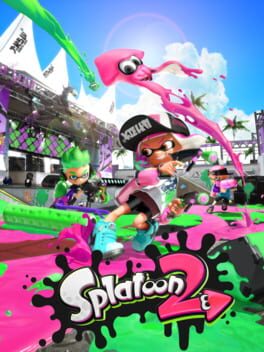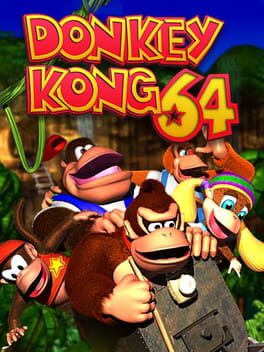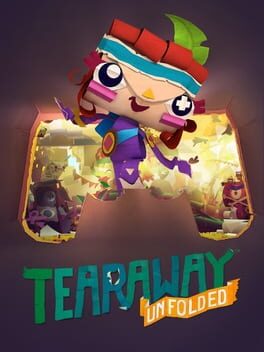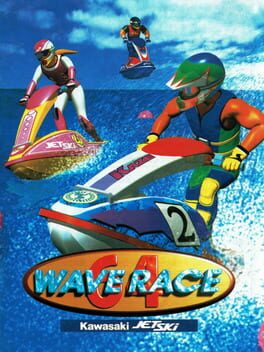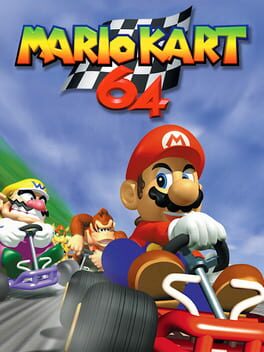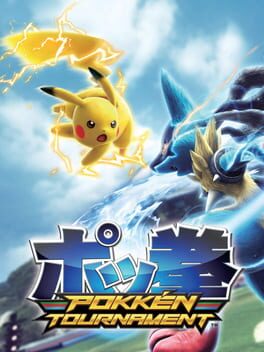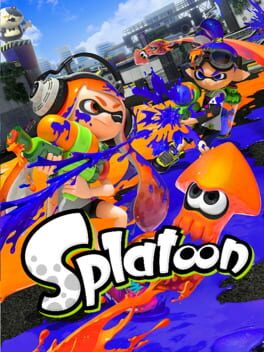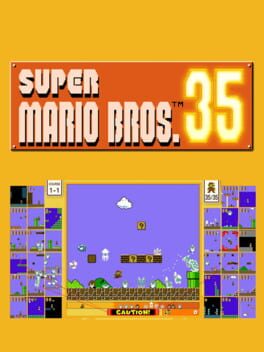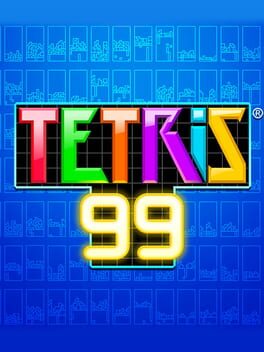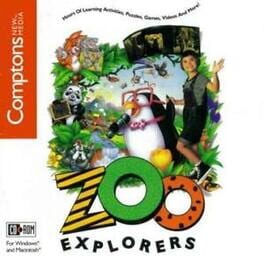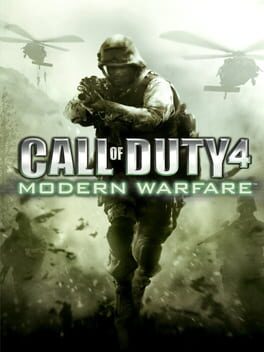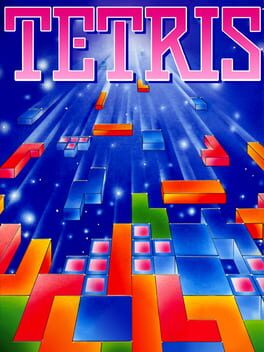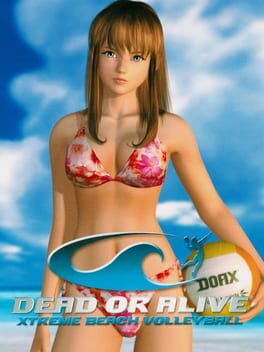Hot_Anarcocoa
BACKER
2017
1999
In general, collectathons are not my preferred form of platformer. So the fact that Donkey Kong 64 has multiple characters that it requires you to switch between to get different collectables, even though those collectables are easy reachable with any character, makes the bulk of this game not very enjoyable to me. However, I do have very fond memories of playing the third person shooter multiplayer in this as a kid! It's a very weird inclusion, giving all the Kongs various nut and fruit shooting guns, but it turned out to be tons of fun and the saving grace of this game for me!
2015
One of the most aesthetically pleasing and mechanically creative games I've played. This game should've come bundled with every PS4 the same way Wii Sports was with the Wii and Nintendo Land was with the Wii U, as it's the only game I can think of that successfully showcases every unique feature of the system. Taking a fully papercraft world and using that setting to allow the player to craft elements of it from the shape of the snowflakes, to their outfit design, to the look of their paper airplane, is just a brilliant creative design choice. It's perfect for people like me who look at something like the level creator in LittleBigPlanet and get overwhelmed by the possibilities of a completely blank slate. This game offers you just enough creative freedom within its well crafted linear story that it's super easy and fun for anyone to get into. A very light hearted and charming experience from beginning to end, I very much recommend this underrated gem to anyone with a PS4.
1996
Big nostalgia for this game. While it doesn't have the intense speed of something like F-Zero X or the item based mayhem of Mario Kart 64, what this game does have is the vibes, man! The music and the gorgeous colorful art direction in this game are just wonderful to chill out to, and the N64 water physics making you bounce around as you race on your jet ski is still really fun! Having to maneuver yourself around the correct sides of the buoys is also a neat design choice to keep you more engaged in where you're going. I still return to this one from time to time because there's just not any other racing game like this.
1996
My 2nd favorite Mario Kart after 8 due to good item balance and how much I played it as a kid. If you're used to the new ones the physics will seem outdated to you, but it's also the most newcomer friendly entry in the series. It doesn't have the difficulty of the first game, and the drifting mechanics are there, but by no means do you need to be reliant on them.
2012
2015
Ever since I played this I referred to it as "the Splatoon of fighting games" because of how short and fast paced the matches are, as well as how easily a comeback from behind can be made. Love that aspect of it. The fighting mechanics themselves, while staying true to the rock-paper-scissors trio of classic fighters, manages to feel unique with its 2d-to-3d mode changes, as well as charge attacks and support Pokémon. This was also the game that introduced me to the absolute legend that is Pikachu Libre and I got this game solely for that reason, and was pleasently surprised by how much I ended up loving it.
2015
Love love love this game! Single player is a bit boring except for the awesome final boss fight, but the multiplayer is incredible and probably the only thing I will ever get an S rank in online. I love how this game simultaneously proves that you can make a shooter that isn't steeped in violence, while also showing how to innovate on traditional shooter mechanics with creative movement mechanics and objectives. I also love how fast paced the matches are, with ranked battles having a timer of 5 minutes but easily being able to be finished within a couple minutes, or even 20 seconds if you manage a successful B-line with the objective. I love how during those matches, you're always able to make a comeback, as the aforementioned 20 second victory could potentially come at any point in the match even if your team has been struggling for a while. And while I also love Splatoon 2, I think the Wii U gamepad really contributes to this game. Being able to set beacons to detect enemies, and quickly glace down at your gamepad to see enemy and ally positioning, and tap on an ally to super jump to them, and then turn your eyes back towards your tv to execute your attack feels fantastic, and I much prefer it to holding down a button to bring a map overlay over the screen. Also, the ink roller is one of if not the most satisfying weapons I've ever used in a video game. Going into squid form to zip, dip, dodge, and dive around opponents and then quickly jumping out to deliver swift splats like a ninja just feels amazing. Last thing to gush over is just how aesthetically amazing this whole game is. From the very 90's bright colors and attitudes of the characters, to the whole squid soundtrack, it's just a joy throughout. Definitely my favorite multiplayer shooter franchise.
2020
2019
1995
1989
2019
This review contains spoilers
It's really easy to make fun of Kojima labeling this game as a new genre, a "strand-type game", but in a way I see what he's trying to get at. It's weird to me that around the time of this game's release so much of the talk around it was "What is this about!?" and the plethora of explainers and overly long videos online. This game hammers you on the head over and over with what it's about: connection. This, I believe, is the core of what makes something a "strand-type game." It's not the long cinematic cutscenes, it's not the even longer stretches of traversing the world, it's connection.
While many of the complaints around this game center around how its gameplay consists primarily of traversing a largely empty landscape, it is this design choice which I think binds the game together with its narrative themes so well. The inhabitants of this world have chosen to isolate themselves from society. Your protagonist, a delivery contractor named Sam Porter-Bridges, likewise lives his life mostly in solitude. It's not an easy life for him, but it's one he's become comfortable in. As much as people say that this game's world is barren, it is not void of obstacles. This is a "walking sim" in a truer sense than most, as the challenge of the game is figuring out how to get from place to place while trying to have the least amount of environmental hinderances in your path. Choosing what gear to bring along with you, and how heavy a load to carry, using what knowledge you have about the path to your destination to inform your decisions.
It is not long into the game however, that the narrative forces Sam to begrudgingly enter into a contract to try to reconnect America. You do so by delivering packages to various locations, some larger key delivery points, but also smaller, single occupancy residential units. By delivering repeatedly to these places, you build interpersonal connections with their residents, as well as convincing them to join the chiral network. Joining the chiral network is a larger form of connection, essentially an internet which allows communication across long distances, but it is also how the game allows you to build structures in those areas, most importantly bridges and highways.
It is not only through these narrative beats however, that the gameplay options open up and reinforce these themes of connection. It is also in the way the game uses its online functionality, to connect you with real world players. Building a highway across America is understandably both the most useful and the most difficult thing in the game, as it's a task which requires vast amounts of resources to achieve. At one point in the game I hadn't realized that it was only in the areas connected to the chiral network which other players could contribute to my structures. This made a couple segments of road incredibly arduous to build, requiring me to make a much larger amount of deliveries and searching harder for the specific resources I needed to build that road. Once I realized my mistake, it obviously became priority to establish connections across the various areas, so that I could receive help from the other players, and we could all contribute our various parts to create a much larger whole, and make this environment which was once harsh to traverse, into a vast connection of structures and characters. One of the most interesting elements of this game's online functionality, and one which I believe is core to the "strand-type game" is the fact that you never actually see any of these players who help you and likewise, they never see you. You can see the name of a person who built a structure, and you can go into the menu and see their profile, and establish connections with specific players if you've noticed them being particularly helpful; but you never see them running around in the world itself, you see merely what they've left behind. It's a design choice that at once prevents the typical hazards of introducing online play into a game: the other players cannot grief you or try to ruin your immersion. But it also instills a sense that none of this mutual aid is being done purely for selfish gain. When you leave a rope behind that you may never use again, you do so with the belief but not necessarily the knowledge that maybe at some time, it may help another player along the same path. When you establish the chiral connection you do so in the knowledge that you'll receive a benefit from it, but also that you will be benefitting others along their way. The connections we build form a vast web that branches out into many directions and go further than we'll ever be able to see, but we know they have an effect nevertheless.
The game does stumble in places though. My biggest critique would be that, either due to lack of imagination, or wide appeal as a AAA game, the game can't have any biting commentary on what connections would be helpful. It's all this vague idea that "uniting America" and "bringing people together again" is the most important thing. But that could be interpreted as some really milquetoast liberal rhetorical speech like Die Hardman gives, or it could be interpreted as restructuring society, but I think you have to bring your own beliefs to the latter, the game won't put them there. In its apprehension to make a more radical statement, it loses a potentially stronger message. Also, Kojima's obsessions with brands and celebrity are very present in this game which, coupled with the the fetishistic way this game talks about America, cast doubt on a more potentially radical message that this game could have.
There are people in bunkers in the game who actually give critiques of past-America but then they join the UCA because "maybe this time we'll be more connected and better off." But it's never stated how exactly things will fundamentally change. It strikes me in the same way as when liberals talk about how "Trump has divided us." But like, no dude, there were many systems in place already dividing us, and I'm not sure this game knows that. It just gestures at a vague "help each other" which every player can neatly fit into their own worldview.
Overall I liked the game, but I'd like to see the same ideas tackled by someone willing to be more radical with it. As pretentious as labeling your own game as a new genre that is named after said game is, I'd like to see more games that use this core idea of exploring connection through mechanics come about. In a medium filled with ample depictions of competition and struggle, this game's clever design choices bring refreshing new options to the medium.
Side note: I think Kojima might hate women a little bit. And wtf was that part where you rescue Amelie and Fragile is like "Oh I see u don't need me anymore!" Like was there supposed to be an implied romance all of a sudden!?
While many of the complaints around this game center around how its gameplay consists primarily of traversing a largely empty landscape, it is this design choice which I think binds the game together with its narrative themes so well. The inhabitants of this world have chosen to isolate themselves from society. Your protagonist, a delivery contractor named Sam Porter-Bridges, likewise lives his life mostly in solitude. It's not an easy life for him, but it's one he's become comfortable in. As much as people say that this game's world is barren, it is not void of obstacles. This is a "walking sim" in a truer sense than most, as the challenge of the game is figuring out how to get from place to place while trying to have the least amount of environmental hinderances in your path. Choosing what gear to bring along with you, and how heavy a load to carry, using what knowledge you have about the path to your destination to inform your decisions.
It is not long into the game however, that the narrative forces Sam to begrudgingly enter into a contract to try to reconnect America. You do so by delivering packages to various locations, some larger key delivery points, but also smaller, single occupancy residential units. By delivering repeatedly to these places, you build interpersonal connections with their residents, as well as convincing them to join the chiral network. Joining the chiral network is a larger form of connection, essentially an internet which allows communication across long distances, but it is also how the game allows you to build structures in those areas, most importantly bridges and highways.
It is not only through these narrative beats however, that the gameplay options open up and reinforce these themes of connection. It is also in the way the game uses its online functionality, to connect you with real world players. Building a highway across America is understandably both the most useful and the most difficult thing in the game, as it's a task which requires vast amounts of resources to achieve. At one point in the game I hadn't realized that it was only in the areas connected to the chiral network which other players could contribute to my structures. This made a couple segments of road incredibly arduous to build, requiring me to make a much larger amount of deliveries and searching harder for the specific resources I needed to build that road. Once I realized my mistake, it obviously became priority to establish connections across the various areas, so that I could receive help from the other players, and we could all contribute our various parts to create a much larger whole, and make this environment which was once harsh to traverse, into a vast connection of structures and characters. One of the most interesting elements of this game's online functionality, and one which I believe is core to the "strand-type game" is the fact that you never actually see any of these players who help you and likewise, they never see you. You can see the name of a person who built a structure, and you can go into the menu and see their profile, and establish connections with specific players if you've noticed them being particularly helpful; but you never see them running around in the world itself, you see merely what they've left behind. It's a design choice that at once prevents the typical hazards of introducing online play into a game: the other players cannot grief you or try to ruin your immersion. But it also instills a sense that none of this mutual aid is being done purely for selfish gain. When you leave a rope behind that you may never use again, you do so with the belief but not necessarily the knowledge that maybe at some time, it may help another player along the same path. When you establish the chiral connection you do so in the knowledge that you'll receive a benefit from it, but also that you will be benefitting others along their way. The connections we build form a vast web that branches out into many directions and go further than we'll ever be able to see, but we know they have an effect nevertheless.
The game does stumble in places though. My biggest critique would be that, either due to lack of imagination, or wide appeal as a AAA game, the game can't have any biting commentary on what connections would be helpful. It's all this vague idea that "uniting America" and "bringing people together again" is the most important thing. But that could be interpreted as some really milquetoast liberal rhetorical speech like Die Hardman gives, or it could be interpreted as restructuring society, but I think you have to bring your own beliefs to the latter, the game won't put them there. In its apprehension to make a more radical statement, it loses a potentially stronger message. Also, Kojima's obsessions with brands and celebrity are very present in this game which, coupled with the the fetishistic way this game talks about America, cast doubt on a more potentially radical message that this game could have.
There are people in bunkers in the game who actually give critiques of past-America but then they join the UCA because "maybe this time we'll be more connected and better off." But it's never stated how exactly things will fundamentally change. It strikes me in the same way as when liberals talk about how "Trump has divided us." But like, no dude, there were many systems in place already dividing us, and I'm not sure this game knows that. It just gestures at a vague "help each other" which every player can neatly fit into their own worldview.
Overall I liked the game, but I'd like to see the same ideas tackled by someone willing to be more radical with it. As pretentious as labeling your own game as a new genre that is named after said game is, I'd like to see more games that use this core idea of exploring connection through mechanics come about. In a medium filled with ample depictions of competition and struggle, this game's clever design choices bring refreshing new options to the medium.
Side note: I think Kojima might hate women a little bit. And wtf was that part where you rescue Amelie and Fragile is like "Oh I see u don't need me anymore!" Like was there supposed to be an implied romance all of a sudden!?
Surprisingly solid volleyball game, probably my go-to for a volleyball game, not that there's a whole lot of competition. This was back when volleyball was actually in the title of this series, so there's a lot less focus on staring at the sexy anime girls compared to later entries, although it is absolutely still there.
